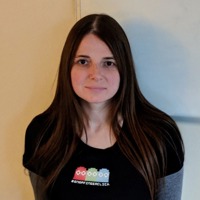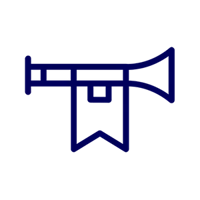
Joanna Haslam
Design Director at Snap Finger Click
When it comes to design, follow your instincts, break the rules, and don't refuse to change something just because it's how it's always been done.
About Joanna...
Who am I?
"My personality types show I'm a campaigner, an explorer, and a trainer.In my job, I often campaign for the best features in a game. I like to understand everyone's point of view and make sure we're building something the whole team are happy with. I love it when people ask me questions about my design and I enjoy discussing different solutions.I spend a lot of time exploring when I design games. The answers don't always just come to me. Instead, I need to research and try different methods until I've figured out a number of possibilities. I find this a practical way to solve problems that means I'm confident I've looked at every potential solution and weighed up the pros and cons to find the best one.Being a trainer is important in any job. We all work differently and when you manage people, you need to understand how they work best. I share my knowledge and give advice to others but I don't expect people to work in the exact same way I do. I encourage my team to try new things and help them find their own way of tackling tasks that works best for them."
What do I do?
"As a game designer, I decide how everything works. In the early stages of making a game, this might involve coming up with the idea of what the game is about, its genre or what the story might be, and the different things the player can do. I work closely with a team of people that includes programmers who build the game from the design, and artists who make the visuals. What I do day-to-day depends on what stage of development a game is at. An important task I have is to write the game design document (GDD) which is a big manual of how everything works. I make lots of diagrams and storyboards to show how I want the game to function. I keep this document up-to-date throughout the project.I playtest the game to see if what I designed in theory makes sense in practice. I often need to change values to make something faster or slower - a process called balancing. I'll play the game over and over, making changes until I'm happy with how it feels to play. Designers also take responsibility for the in-game text, writing instructions or lines of dialogue. Games that have lots of speech may have a specialist narrative designer. Level design is another common area of expertise.Designers contribute to pitches for games where a team comes up with a new game idea and tries to sell it to someone who will pay for it to be created. Towards the end of a project, designers often help out with QA (quality assurance) testing to make sure the game doesn't have any bugs and has been built to match the intended design.I enjoy being a designer because I love to solve problems. When making games, you come up against lots of challenges. I like to figure things out and it feels very satisfying to find a solution to a difficult issue.Salary depends on experience and location. Junior designers start on around £20-25k. After a few years' experience, game designers can expect to earn £30-35k, with senior or lead designers earning up to £45k, especially if they work in the London area."
How did I get here?
"When I was at school, I had a passion for creative writing, technology, and the media. I didn't realise it was possible to find a career that encompassed all three, so I spent my teenage years trying to decide if I wanted to be a programmer, a novelist, or a journalist. I studied English, Media Studies, Maths and ICT at A-level before choosing to do a BSc in Computer Science.After completing my Computer Science degree, I still wasn't sure what I wanted to do. I ended up staying on to do an MA in Digital Media. During this time, I got the opportunity to work as a freelance Producer for the BBC making short films for the web about how people spend their weekends. This turned out to be a great role for me because I got to research and interview people, shoot and edit a film about them, then write a copy piece for the website. It was a varied role that gave me a good insight into the world of media.After finishing my MA, I started looking for a more permanent job. I attended a career fair in Brighton and discovered a company called Relentless Software whose biggest claim to fame is creating the Buzz! series of quiz games. I hadn't seriously considered a career in games up to that point, but when I read their job description for a Junior Designer, I realised it was the perfect role for me. The responsibilities included writing lines of commentary and taking control of the technical side of the speech system to get the dialogue playing in-game - the ideal combination of creativity and technology that I never thought was possible to find. The fact this job was also in an exciting and emerging part of the media was a big bonus too.After an interview and successful script-writing test, I was hired as a Junior Designer. I went from Junior to Regular to Senior Designer and after 11 years in the games industry, I'm now the Design Director at Snap Finger Click, making games for people to play together in the living room and online over live-streaming platforms like Twitch."
The life I live
"One of my favourite things to do in my spare time is cooking and baking. I enjoy cooking because it's both scientific and creative - just like my job as a game designer! When I bake a cake, I'll bring it into the office for the rest of the game development team to enjoy. I've yet to meet a game developer that doesn't like cake!I'm very passionate about music, dancing, and singing. I love to build playlists on Spotify for just about any occasion. I'm a big fan of the SingStar and Just Dance games, and I've recently started playing Twitch Sings which is an online karaoke game.I've also been a qualified First Aider for nearly ten years."
My typical day
"One of the great things about being a game designer is that there's no real daily routine. I don't always know how long it will take to get the design right, so I spend a lot of time discussing ideas with the team. I play and test the game constantly, listen to feedback and try out different things.My work varies depending on what the project is and what stage it's at. In the early part of development, I'll be brainstorming ideas and writing pitch documents. When we've decided on a feature, it's my job to figure out the details and add it to the game design document (GDD). All the while, I have to make sure everything happening with the game matches the vision of the project. In the later stages, my time is spent balancing the game to tweak timings, placement of objects etc., to make it enjoyable and fun to play. Once the game is in its final stages, I do what I can to support the producer with responding to emails and feedback, and testing for bugs in the game and fixes to those bugs.I work in a relaxed office. I don't spend all day at my desk, as I regularly need to discuss parts of the game with other members of the team. We have informal meeting spaces and even a special booth where we live-stream to our community twice a week.I constantly collaborate with other members of the development team such as artists, programmers and producers. We go through tasks together to make sure we're all happy with each part of the game. Every Friday, we play through the game to review the work we've done during the week, making notes on areas we want to improve."
My qualifications
"- A levels in English Language & Literature, Information & Communications Technology, Mathematics and Media Studies (all grades A-C)- BSc Computer Science, 1st class (Hons)- MA Digital Media, Merit"



